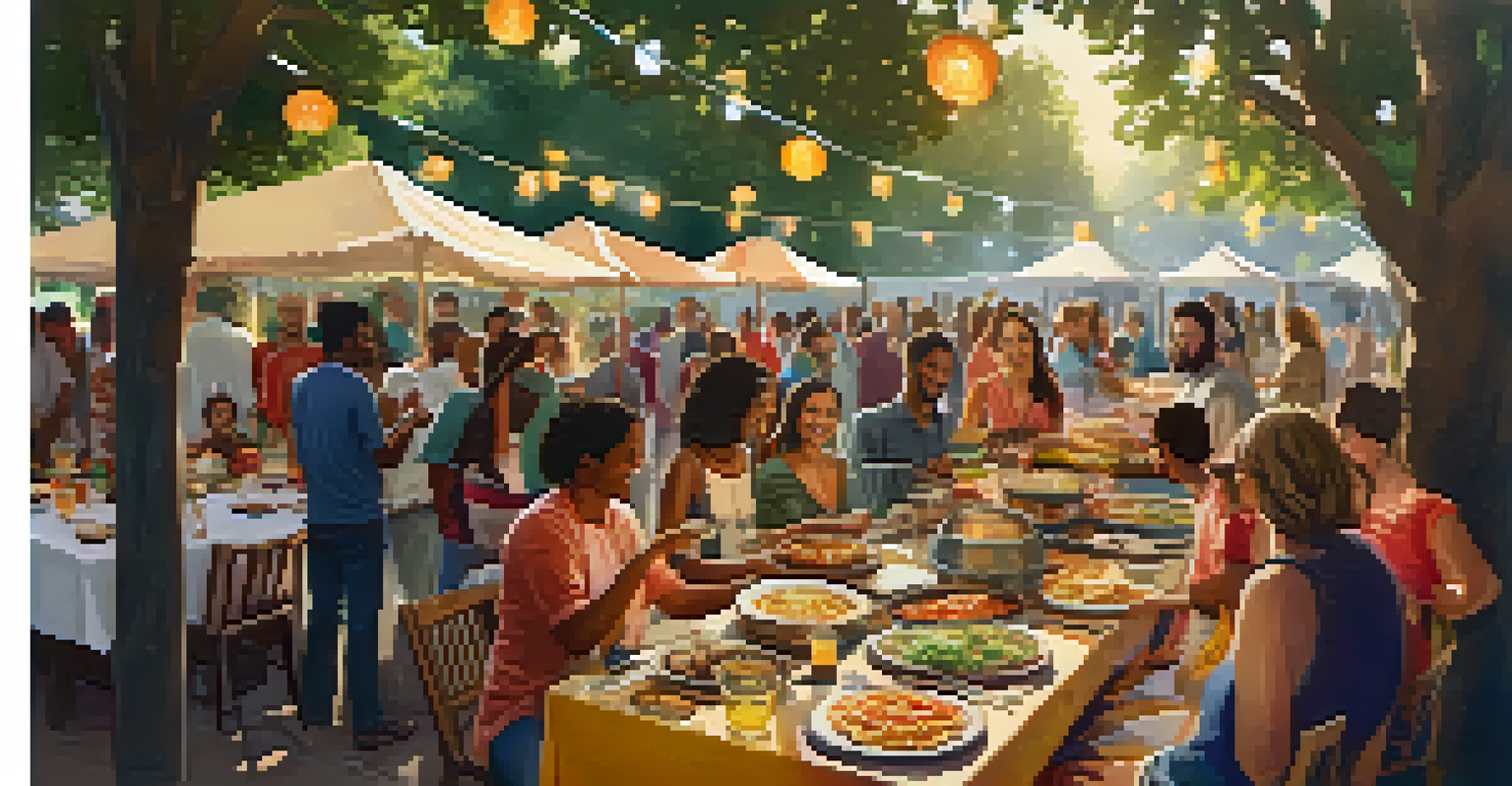Culinary Heritage: Understanding Its Impact on Identity

What is Culinary Heritage and Why It Matters
Culinary heritage refers to the traditional cooking practices, recipes, and food-related customs that are passed down through generations. It encompasses everything from regional dishes to cooking techniques that are unique to a culture or community. Understanding culinary heritage is vital as it forms a significant part of our cultural identity.
Food is an important part of a balanced diet.
Each dish tells a story, reflecting the history, geography, and social customs of a community. For instance, the spices used in Indian cuisine not only add flavor but also narrate the tale of trade routes and cultural exchanges. This connection between food and identity emphasizes why preserving culinary traditions is essential in today's fast-paced world.
Moreover, culinary heritage fosters a sense of belonging. When individuals share meals that have been part of their family history, they connect with their roots and with one another. This bond reinforces community ties and strengthens personal identities, making culinary heritage a crucial aspect of our lives.
Culinary Traditions as Cultural Identity Markers
Food is often a reflection of who we are and where we come from. Different cultures have unique culinary traditions that serve as markers of identity. For example, the preparation of a traditional Italian pasta dish during family gatherings not only brings people together but also honors the family's heritage.

Culinary traditions also act as a bridge between generations. Grandparents teaching their grandchildren how to cook traditional recipes creates bonds and ensures that these important cultural narratives are not lost. These cooking sessions become a cherished ritual, reinforcing the family's cultural identity.
Culinary Heritage Shapes Identity
Culinary heritage plays a crucial role in shaping personal and cultural identities through traditional recipes and cooking practices.
Furthermore, as globalization brings diverse cuisines into our daily lives, understanding our culinary heritage helps us appreciate our unique identities amidst this melting pot. It allows individuals to celebrate their roots while embracing new flavors, creating a rich tapestry of cultural experiences.
The Role of Food in Community Building
Food has a remarkable ability to bring people together, fostering community spirit and collaboration. Community potlucks or food festivals often highlight local cuisine, allowing individuals to share their culinary heritage and learn from one another. These gatherings create a sense of belonging and mutual appreciation among diverse groups.
Cooking is one of the greatest gifts you can give to those you love.
For example, in many cultures, communal meals play a vital role in social interactions. Whether it's a family dinner or a neighborhood barbecue, these shared experiences strengthen bonds and promote understanding. The act of cooking and sharing food can break down barriers and create lasting friendships.
Additionally, local food movements and farmers' markets celebrate and preserve culinary traditions while supporting sustainable practices. By choosing to buy local foods, communities not only honor their culinary heritage but also invest in their local economies, reinforcing those community ties.
Culinary Heritage and Personal Identity Development
Culinary heritage significantly impacts personal identity development as it shapes our tastes, preferences, and values. The flavors we grow up with often influence our culinary choices throughout life, creating a deep-rooted connection to our heritage. For instance, someone raised in a Mexican household may have a lifelong love for tacos and mole, appreciating their cultural significance.
Moreover, cooking and sharing traditional dishes can boost self-esteem and identity. When individuals prepare meals from their heritage, they express their uniqueness and pride in their culture. This form of self-expression can be particularly empowering for those navigating multiple cultural identities.
Food Builds Community Connections
Shared meals and culinary traditions foster community spirit, helping to strengthen bonds and promote understanding among diverse groups.
Finally, culinary heritage can offer individuals a sense of purpose. By actively participating in the preservation of traditional recipes or cooking methods, people contribute to the continuity of their culture. This connection to heritage strengthens their identity and fosters a deeper appreciation for their culinary roots.
The Influence of Globalization on Culinary Heritage
Globalization has drastically changed the culinary landscape, introducing us to a diverse array of international cuisines. While this exposure allows for exciting culinary fusions, it can also pose a threat to traditional culinary practices. As fast food and convenience meals become more prevalent, some culinary traditions risk being overshadowed.
However, globalization can also create opportunities for cultural exchange. It encourages chefs and home cooks alike to explore and incorporate elements from various cuisines while still honoring their culinary heritage. This blend can lead to innovative dishes that celebrate multiple cultures and expand our culinary horizons.
Navigating this balance between preserving traditional practices and embracing new influences is essential. By being conscious consumers who appreciate and support local culinary heritage, we can help ensure that these invaluable traditions continue to thrive in an ever-changing world.
Preserving Culinary Heritage for Future Generations
Preserving culinary heritage is essential for maintaining cultural identity and passing on traditions to future generations. Families can play a crucial role by documenting recipes, sharing cooking techniques, and creating opportunities for younger members to engage with their culinary roots. This practice ensures that the flavors of the past are not forgotten.
Community initiatives, such as cooking classes or heritage festivals, can further promote the preservation of culinary traditions. These events not only educate participants about their cultural cuisine but also create a platform for intergenerational knowledge sharing. When communities celebrate their culinary heritage, they reinforce its importance for the next generation.
Globalization Affects Culinary Traditions
While globalization introduces exciting culinary fusions, it also poses a threat to traditional practices that need preservation for future generations.
Lastly, the digital age offers unique opportunities for preserving and sharing culinary heritage. Social media platforms and websites allow individuals to share their family recipes and cooking stories, which can inspire others to explore their culinary roots. This online engagement can create a virtual community, keeping culinary heritage alive.
Conclusion: The Lasting Impact of Culinary Heritage
Culinary heritage plays a vital role in shaping our identities and fostering connections within communities. By understanding and valuing our culinary traditions, we not only honor those who came before us but also create a foundation for future generations. The flavors and stories behind our food are integral to who we are.
As we navigate an increasingly globalized world, it's important to strike a balance between embracing new influences and preserving our culinary heritage. By doing so, we can celebrate our unique identities while fostering appreciation for the diverse culinary landscape around us.

Ultimately, culinary heritage is more than just food; it is a living testament to our history, values, and community spirit. When we share meals and recipes, we create bonds that transcend cultural boundaries, enriching our lives and those of future generations.